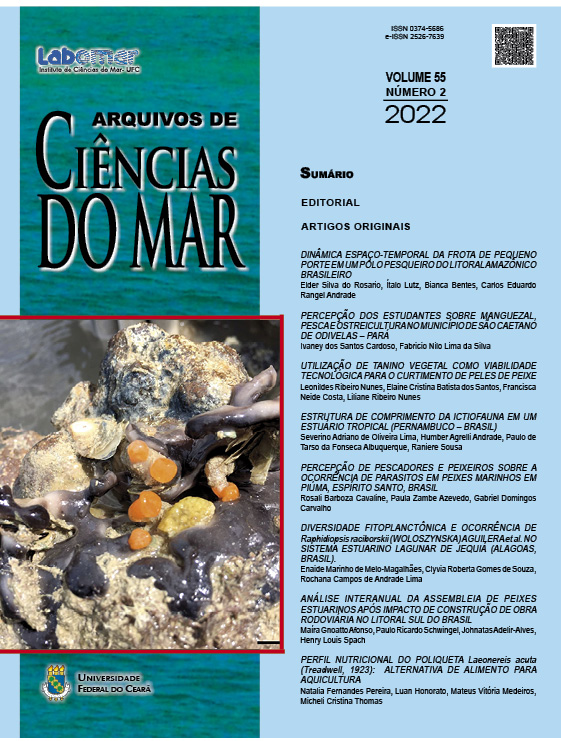State of the art of the environmental impacts shrimp farming
DOI:
https://doi.org/10.32360/acmar.v55i2.72247Abstract
The objective of this work was identify the main environmental aspects and impacts generated in shrimp farming and the preventive, mitigating and management measures used. A bibliographic survey was carried out on electronic search platforms using as exclusion criteria works prior to 2011, papers with Qualis less than B2 and studies in shrimp farming of fresh water, being selected articles that deal with shrimp farming management, life cycle assessment (LCA ) and/or environmental impacts. Were identified 28 environmental impacts from shrimp farming, caused by 13 environmental aspects. The main aspect and impact pointed out in most of the works were: energy consumption and reduction of fauna and flora biodiversity. The management measures, when adopted at high levels, ensure the health and productivity of the shrimp, allied to the maintenance of environmental and economic quality, with emphasis on superintensive systems. The most used impact management tool was LCA, however most of the works did not detail the complete life cycle. This review allowed us to conclude that it is possible to improve the environmental performance of shrimp farming with increased productivity through mitigating measures, such as adequate environmental management and good management practices, as well as the use of tools such as coastal geoprocessing and environmental licensing.
Keywords: LCA, life cycle, shrimp, environmental management, good management practices
Downloads
Published
Issue
Section
License
1. Proposta de Política para Periódicos de Acesso Livre
Autores que publicam nesta revista concordam com os seguintes termos:
- Autores mantém os direitos autorais e concedem à revista o direito de primeira publicação, com o trabalho simultaneamente licenciado sob a Licença Creative Commons Attribution que permite o compartilhamento do trabalho com reconhecimento da autoria e publicação inicial nesta revista.
- Autores têm autorização para assumir contratos adicionais separadamente, para distribuição não-exclusiva da versão do trabalho publicada nesta revista (ex.: publicar em repositório institucional ou como capítulo de livro), com reconhecimento de autoria e publicação inicial nesta revista.
- Autores têm permissão e são estimulados a publicar e distribuir seu trabalho online (ex.: em repositórios institucionais ou na sua página pessoal) a qualquer ponto antes ou durante o processo editorial, já que isso pode gerar alterações produtivas, bem como aumentar o impacto e a citação do trabalho publicado (Veja O Efeito do Acesso Livre).

